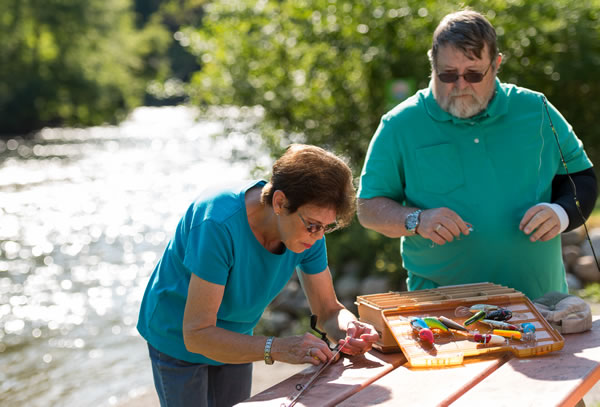Move, Breathe, Eat, Relax
Preparing for cancer surgery leads to better recovery

Martha Driskel, 68, was glad to finally be enjoying the tourist resort area in Missouri where she’d worked for 25 years. She and her husband, Ron, spent their time fishing and boating until acid reflux symptoms led to a diagnosis of esophageal cancer in early 2016, requiring surgery. Driskel wanted to recover and get back to her retirement, fast.
She came to the University of Michigan Rogel Cancer Center because of its reputation for treating esophageal cancer and its better rates for long-term survival. Thanks to the new Michigan Surgical and Health Optimization Program, her recovery went better than expected.
"I was told about MSHOP after my appointment with Dr. (Jules) Lin. I hadn't realized it was optional, but of course I agreed to it. Why not? I wanted the best results after my surgery," Driskel says.
She returned home to Missouri to prepare for surgery and, soon after, a box from MSHOP arrived in the mail. It contained a breathing tool called a spirometer, a pedometer to track daily steps, an information booklet and DVD to introduce the program.
"Making small changes in your daily routine can make a big impact. Our program is based on four pillars that can have a big effect on how well you recover following surgery," says William Palazzolo, the medical director of MSHOP. "They are MOVE, BREATHE, EAT and RELAX."
Palazzolo explains there are certain risk factors that increase the chance of complications during and after surgery:
- Being inactive -- decreases muscle mass and weakens muscles
- Eating a poor diet -- depletes the immune system and may cause nutrient deficiencies
- Smoking or using tobacco products -- decreases breathing capacity and ability to heal properly
- Drinking too much alcohol -- decreases nutritional status and negatively impacts the immune system
- Being stressed -- drains the immune system
- Not sleeping well -- also depletes the immune system
Driskel went online to MSHOP and began tracking her progress. She aimed to walk 5,000 steps per day, ate several small meals each day, added protein to her diet and tried to get enough sleep. Because she is lactose intolerant, she spoke to a cancer nutritionist for food tips. The program sent reminder messages to track her progress if she missed a day. She was able to view graphs to see improvements.
"It's wonderful that they have this kind of program so people are better prepared physically. You try to prepare yourself emotionally and spiritually, but you also have to do your work to be sure your body is healthy," Driskel says.
Driskel spent only seven days -- the minimum stay -- in the hospital recovering from her transhiatal esophagectomy. She and her daughter Beth began walking together in the hospital after just a few days. She continued using tools she'd learned from MSHOP at their hotel after she was released and continues to do so back home in Missouri.
Because she found the program so helpful, she shared what she'd learned when a good friend was diagnosed with breast cancer. She bought her a pedometer and spirometer, and copied some of the printed materials.
At a check up back home in Missouri, the gastroenterologist told Driskel "it was one of the nicest esophagectomies he'd ever seen, and compliments to Dr. Lin."
Read the Fall, 2016 issue of Thrive
Learn more about preparing for surgery and making decisions about treatment
